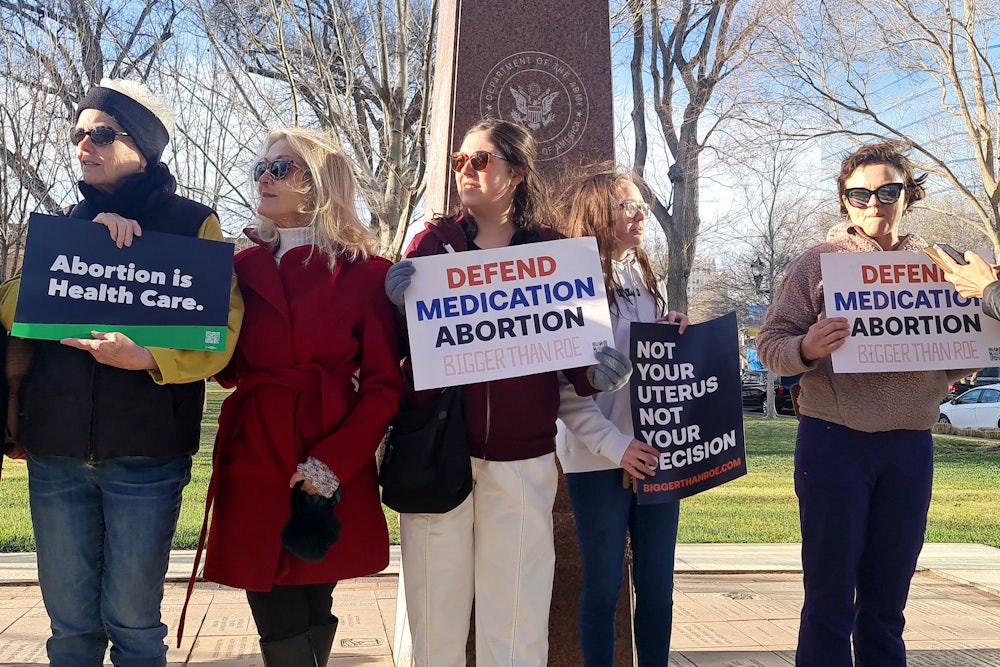When Texas Federal Judge Matthew Kacsmaryk overruled the Food and Drug Administration’s approval of the abortion medication mifepristone late last Friday, not only was he attempting to wrest away control of our reproductive lives through a wild abuse of the law, but he was also attempting a resurrection of a notorious anti-abortion crusader who has been dead for more than a century, Anthony Comstock. Kacsmaryk is a Trump appointee serving on the United States District Court for the Northern District of Texas. Comstock is the uncanonized patron saint of sexual purity, the nineteenth-century moral entrepreneur behind an 1873 federal anti-obscenity law bearing his name, one that is still inexplicably on the books to this day. By bringing Comstock back to the forefront of the legal canon, Kacsmaryk wasn’t just ruling directly on abortion medication but offering notice that a 150-year-old law that many had presumed dead is the next vehicle that conservatives will employ to roll back sexual and reproductive freedom for anybody in the United States.
Kacsmaryk’s bow to Comstock comes in the latest order in a landmark abortion case brought with the backing of anti-abortion groups attempting to ban mifepristone, one drug used in medication abortion. It is one of the most consequential post-Dobbs reproductive rights cases, devised by legal minds on the Christian right, such as Alliance Defending Freedom, for the express purpose of winning a total, nationwide abortion ban. Kacsmaryk moves them closer to that goal in his order, citing the Comstock Act to support the plaintiffs’ attempt to overturn the FDA’s 23-year-old approval of mifepristone. Further, Kacsmaryk claims that the plaintiffs are likely to succeed in their argument that the Comstock Act already prohibits mailing mifepristone. The result is that the FDA’s approval of mifepristone will be overturned, effective this Friday, unless a higher court reverses Kacsmaryk’s ruling.
The Department of Justice has already challenged this order. It had also already weighed in on this precise question of the Comstock Act and mailing mifepristone for abortion. A recent memorandum from DOJ’s Office of Legal Counsel offers its interpretation of the Comstock Act, namely that it “does not prohibit the mailing of certain drugs that can be used to perform abortions where the sender lacks the intent that the recipient of the drugs will use them unlawfully.” We would not be in this position, of course, if it was ever a political priority to repeal the Comstock Law in its entirety. The same kind of dangerous mythmaking about legal norms that made Roe v. Wade seem inviolable is what got us here and what further enables the right’s all-out, deeply unpopular assault on our rights.
When Comstock the man is remembered at all, it is as an ur-prude. Arriving in New York after the Civil War, Anthony Comstock saw in the exploding metropolis an opportunity to strike a blow against vice, using the Young Men’s Christian Association and its existing anti-prostitution campaigning as an incubator for what became the New York Society for the Suppression of Vice and eventually the drafting of the Comstock Act. The Comstock Act “ensnared ordinary Americans in this vast anti-obscenity legal regime,” said Lauren MacIvor Thompson, historian of birth control and the author of a forthcoming book on the subject, on Democracy Now! this week. At the same time, she added, “when you look at [the Act] as a whole, it’s certainly a violation of the constitution.” Along with his law, what remains of the man is a cartoonishly evil and partial portrait of his efforts, just some grim Victorian sicko peeping into every window.
In truth, Comstock won over wealthy, powerful benefactors to his anti-vice cause, and not necessarily because they were all in on shuttering saloons, outlawing porn, evicting prostitutes, jailing people who sold abortion-causing medicines, and prohibiting the use of the Postal Service for distributing “any article of an immoral nature.” Comstock, not unlike his inheritors, considered the provision of contraception or abortion as vehicles for moral decay and societal ruin. As Thompson and other historians have long noted, the Comstock Act was also rooted in eugenic sentiment, the idea that not enough of the right—in other words, white—babies were being produced. If, while amassing enforcement power for himself aimed at keeping women, immigrants, poor and working-class people in line, Comstock was also able to accrue political power for his supporters, it was not an unintended consequence.
This misremembering of Comstock as a singularly powerful scold may go to explain why today the Comstock Act is sometimes incorrectly presumed a dead letter—an unenforced, forgotten law—or how it is inaccurately characterized as having been overturned by twentieth-century Supreme Court decisions. The Comstock Act’s ongoing relevance just doesn’t square with notions of “a country where, not long ago, social liberalism seemed largely triumphant, with the rapid acceptance of gay marriage, the growing visibility of trans people and over-the-counter access to emergency contraception,” as one New York Times opinion columnist summarized the conventional liberal view of the present day, as if twentieth-century progress on civil rights and reproductive rights carried its own momentum against outmoded nineteenth-century norms, gains stacking up only in one direction. Recent events in the judiciary have only underscored, however, that our courts are not vehicles of ever-forward social progress. Instead, they are more governed by those old norms (for example, that rich white men continue to have outsize, unaccountable influence) than even some reproductive rights defenders have accepted.
The Comstock Act never ended. Neither have the power structures that made it possible.
When the Supreme Court overturned Roe v. Wade in 2022, what followed was a bit of a legal scramble, with people who need abortions and people who provide them thrust into uncertain terrain. Many were unsure if they were now engaging in criminal conduct for seeking and giving care during pregnancy, even for those who didn’t want to end their pregnancy. Fueling this struggle was the legacy of reproductive rights groups’ misplaced trust in the law. While they were focused on preserving legal access to abortion through the courts, presuming the rule of law meant something, nowhere near that level of attention and resources went to addressing all of the ways that pregnancy and abortion were already criminalized—such that, when something like the Comstock Act comes back into play, they are left playing catch-up.
Even those versed in the history of the Comstock Act, myself included, perhaps underestimated the role it would play in a post-Roe world. It looked like Comstock was a tool for policing the dissemination of abortion information online, owing to an update Congress passed in 1996, expanding Comstock’s original site of censorship, the U.S. mail, to the internet. That is still a risk. But now the Comstock Act may be deployed as it was in 1873: to criminalize the use of the postal service to send pills that could cause abortion.
So now, a century and a half later, comes Judge Kacsmaryk. There’s no mystery as to where he stands. He was hand-fed and groomed for this job by right-wing power brokers, like Leonard Leo of the Federalist Society, which has successfully stacked the federal judiciary in its favor. It’s accomplished this thanks to billionaire Republican benefactors like Harlan Crow, who had a painting made of one casual hang with himself, Leo, and Supreme Court Justice Clarence Thomas (and who entertains such guests with his vintage Nazi table linens). They have helped advance anti-abortion-movement inventions, like “the unborn human,” an effort to redefine a fetus as a person, something Kacsmaryk also cites in his order. They are the same set of interests—same funders, same right-wing policy shops—also waging war on queer and trans people in the U.S. in nearly every domain of public life.
You can see Comstock’s fingerprints on all of this, on every campaign to redefine any book or event involving LGBTQ people or subject matters as an obscenity. And as with Comstock, it would be a mistake to see such efforts as an attempted update of his purity crusade, staged as a twenty-first-century culture war. Comstock has been resurrected to assist in the conservative project of banning abortion altogether.
One path would be to win legal recognition of the fetus as a person, who, under the Fourteenth Amendment, would then have the same rights to equal protection and due process as any living person. “I think what people are missing is that they’re coming for the 14th Amendment,” said Laurie Bertram Roberts, co-founder and executive director of the Mississippi Reproductive Freedom Fund. A handful of years older than the Comstock Act, the Fourteenth Amendment is the underpinning of what were seen as safely won civil rights gains for women’s rights and queer and trans rights, from Griswold to Roe, Lawrence to Bostock. “How better to get rid of all of that than by getting rid of and attacking the 14th Amendment?” Roberts continued. “Let’s be real, white supremacists have had issues with the 14th Amendment since day one.”
But there is another path, a more direct one. The Comstock Act could be used more broadly to ban abortion nationwide (and without having to win a Fourteenth Amendment argument anti-abortion groups could well lose). This was the case made by Mark Lee Dickson, one of the architects of Texas Senate Bill 8, the six-week abortion ban enforceable by private citizens in pursuit of bounties, to Amy Littlefield at The Nation. “If an abortion facility cannot receive abortion-inducing drugs or any abortion paraphernalia,” he explained, “then how can they perform abortions?” Does he believe Comstock would support such a legal maneuver? “To be honest,” Dixon told her, “I don’t know a whole lot about him, but I have looked at the laws, of course.”
As of this moment, “for abortion opponents, the Comstock Act is the only realistic way to force through a national ban,” argues Mary Ziegler, law professor and author of Roe: The History of a National Obsession. “That’s because it has nothing to do with what the American people want or what the Constitution means.” What those who assault mifepristone now also share with Comstock is such a quest for power, the law itself be damned. “This renaissance of misogyny and homophobia, this increasingly terrifying regulation of gendered self-expression, meted out under color of law, is what the extreme-conservative Supreme Court justices are there for,” as historian Felicia Kornbluh wrote after the Texas ruling. There is no stopping it without reckoning with that fact. Considering the breadth of conduct the Comstock Act was aimed at, not to mention the right’s big power play of the moment to redefine anything but reproductive sex between one man and one woman as tantamount to obscenity, that queerness and transness is akin to sexual predation. Kacsmaryk himself has railed publicly against what he called the demands of the “Sexual Revolution,” that “the unborn child must yield to the erotic desires of liberated adults.” It would be foolish to think this stops with even a national abortion ban.
For now, mifepristone is still available. Something like due process will carry on. Stays have been filed (by DOJ and by a mifepristone manufacturer) seeking to halt this little Comstock ruling until the Supreme Court can potentially weigh in. The Biden administration has said it will not ignore this clearly out-of-bounds order so as not to set “a dangerous precedent,” and will fight this out in the courts, which, given recent events, feels like admitting defeat. What I can say for Kacsmaryk is at least he knows what role he is playing. He is not presiding over a legal battle narrowly confined to assessing the safety of mifepristone. He’s here to help deliver what Comstock hadn’t fully accomplished: reproductive control and coercion, achieved through both the application and fear of the criminal law, to immiserate people now while crashing the democratic tools the law is supposed to provide for the people to fight back.






